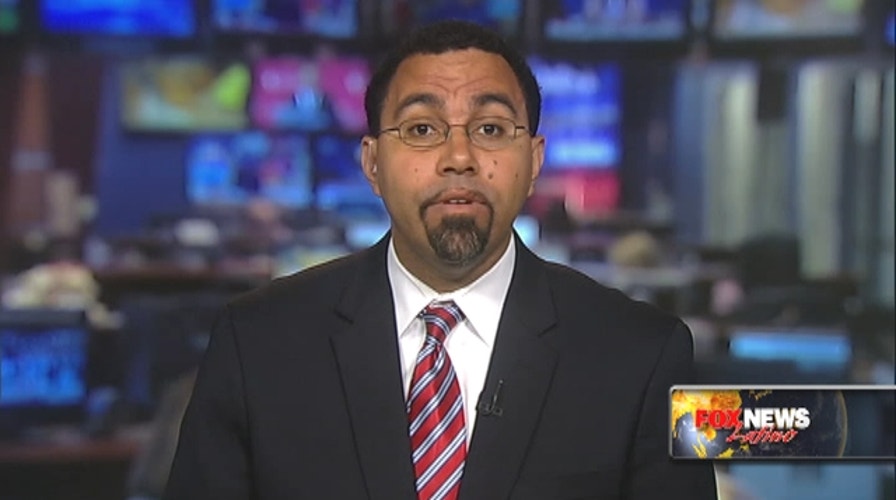U.S. Secretary of Education: Mentors saved my life
Fox News Latino speaks to John B. King Jr, the United States Secretary of Education.
Hispanics have made big strides in education over the last couple of decades. The Hispanic high school dropout rate has fallen dramatically to 12 percent, and the number of Hispanics enrolled in college has more than tripled.
However, research shows Latinos and African-American male students still are suspended from school at nearly double and triple the rate of white students. Some 30 percent and 16 percent of black and Latino students, respectively, have faced a suspension.
And research also shows that students who are pushed out of school are likely to drop out and are at greater risk of landing in jail.
“We see a number of challenges, students who are disconnected from school and dropping out, students who are getting involved in the criminal justice system, young people who are unemployed,” said U.S. Secretary of Education John B. King to Fox News Latino.
Over the last two years, the My Brother’s Keeper initiative has worked to respond to these challenges. Launched in March 2014, MBK is a White House initiative designed to help America’s struggling boys and young men of color by offering mentorship, job training, and better educational opportunities.
The program has stirred controversy, however, with critics calling the program discriminatory, and perhaps unconstitutional, for openly favoring minorities and excluding females.
Since launch, foundations and local agencies have created support programs in 250 communities in all 50 states, fueled by more than $600 million from the private sector.
Our nation’s biggest cities have implemented programs to help close the opportunity gap young minority boys face every day.
Boston has recruited more than 900 mentors, Philadelphia has helped 10,000 teens and young adults get hired for jobs, and the city of Compton in California started a gang violence intervention program which resulted in a nearly 50 percent decrease in homicides from 2014 to 2015.
Still, the heart of the My Brother’s Keeper initiative is improving education – helping young Latino boys stay in school – and that effort is of particular interest to Secretary King.
For Dr. King, who is African-American and Puerto Rican, this program is personal. He understands the importance of mentoring. His mom passed away when he was just 8 years old and his father passed away when he was just 12 years old from undiagnosed Alzheimer’s disease.
“It was teachers in New York City public schools who saved my life, they are the reason I became a teacher and a principal and the reason I’m alive today and certainly the reason I’m doing this work today,” King Jr. said, who went to High School in Coney Island, Brooklyn.
“Those teachers created a space that was safe, engaging, compelling, interesting, a place where I could be a kid when outside of school I wasn’t really able to be a kid,” he added.
Nationwide, black male youth have a 1 in 2 chance of growing up without a father in the house, dropping out of high school and spending time in prison.
In a poignant moment during the speech introducing the program in front of a group of minority boys in 2014, President Obama said he knows firsthand the profound impact of growing up without a male role model.
“I didn’t have a dad in the house, and I was angry about it – I made bad choices,” he said. “I got high. I made excuses. Sometimes I sold myself short…I see myself in these young men,” he added.
Today, the road to solving the educational and opportunity gap in the United States runs directly through the Latino community.
Hispanics make up the majority of students in our public schools with 1 out of every 4 students in K-12 grades. According to a report conducted by Hispanics in Philanthropy, Latinos outnumber young black males (ages 10-24) by 2.6 million and the Latino young male population will continue to outgrow their black male counterparts by more than 3.5 million through 2040.
Hispanic males have a 1 in 6 chance of landing in prison compared to a 1 in 23 chance for white males.
“We’ve been working with school districts to rethink their discipline approaches and to commit to reduce exclusionary discipline — fewer suspensions and expulsions and to focus on restorative justice programs,” Dr. King explained.
“[An approach] where students are doing things like community service to make up for the mistakes that they’ve made and also socio-emotional support from counselors and social workers who work with students as they deal with struggles they may be facing outside of school,” he said.

